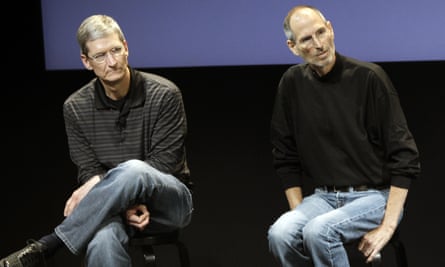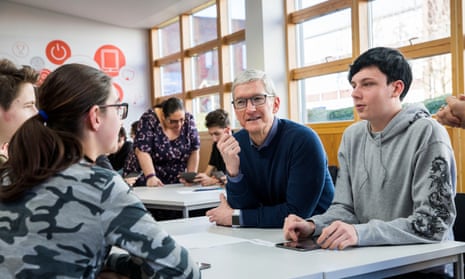The head of Apple, Tim Cook, believes there should be limits to the use of technology in schools and says he does not want his nephew to use a social network.
Cook was talking at Harlow college in Essex, one of 70 institutions across Europe that will use Apple’s Everyone Can Code curriculum, it was announced on Friday.
“I don’t believe in overuse [of technology]. I’m not a person that says we’ve achieved success if you’re using it all the time,” he said. “I don’t subscribe to that at all.”
Even in computer-aided courses, such as graphic design, technology should not dominate, he said.
“There are are still concepts that you want to talk about and understand. In a course on literature, do I think you should use technology a lot? Probably not.”
The 57-year old chief executive, who took the reins at Apple after the death of Steve Jobs in 2011, said the company cared deeply about children outside the classroom.
“I don’t have a kid, but I have a nephew that I put some boundaries on. There are some things that I won’t allow; I don’t want them on a social network.”

Despite having just walked off a plane on a whistle-stop tour of Europe, Cook put the teachers and students at ease. Dressed in a blue jumper, grey jeans and blue suede shoes, he scarcely appears a tech billionaire (Apple is on track to be the first $1tn firm).
“He’s is the most famous person we’ve had here as a guest,” said one teacher. “The second? Oh, David Cameron.”
Born in Mobile, Alabama, in 1960, to a docker and a pharmacy worker, Cook grew up in the town of Robertsdale. He spent 12 years at IBM before Jobs asked him to join Apple in 1998. It was Jobs’ passion and purpose to “serve humanity” that Cook said drew him to the company. “After 15 years of searching, something clicked. I finally felt aligned.”
As senior vice-president of worldwide operations, he closed factories and warehouses, replacing them with contract manufacturers in Asia. He also kept costs under control and secured long-term deals in soon-to-be-crucial parts for the company, including flash memory storage for the iPod Nano, iPhone and iPad, which locked out competitors.
He became chief operating officer in 2007, covered Jobs’s role during his illness in 2009 and took charge two years later.
TimelineTim Cook's rise to the top of Apple
Show
The chief executive of Apple is responsible for guiding the US technology firm to being the first $1tn company in history.
Cook was born on 1 November in Mobile, Alabama, to a docker and a pharmacy worker. He grew up in the small town of Robertsdale.
Graduates from Auburn University in Alabama with a BSc in industrial engineering.
Joins IBM as part of its personal computing business, working his way up to the position of director of North American fulfilment.
Earns an MBA from Duke University's Fuqua school of business in North Carolina.
Serves as vice-president of corporate materials for the Compaq computer firm for six months.
Joins Apple as senior vice-president of worldwide operations at the request of Steve Jobs, who had returned to the firm a year earlier. Credited with revolutionising Apple's supply chain, switching to contract manufacturers.
Promoted to chief operating officer under Jobs.
Takes over as chief executive while Jobs takes a leave of absence for health reasons.
Takes over full-time as chief executive as Jobs takes another leave of absence. Jobs dies on 5 October 2011.
Since then, he has put his own stamp on Apple. In a 2014 profile to mark Cook’s announcement as person of the year, the Financial Times noted his passion for doing “things for other reasons than a profit motive, we do things because they are right and just”. As CEO, he has championed health, e-waste and renewable energy initiatives (claiming to run its own facilities mostly on renewable sources) plus Apple’s educational coding projects.
The one-year coding curriculum adopted by Harlow college, half an hour north of London, is intended to teach students computing skills through the use of a variety of games, lessons and interactive materials.
Every student is given an iPad loaded with coding apps and tools, and the teachers guide them through the concepts of coding. Pupils are able to see their progress and get feedback, finishing the year with two qualifications.
One student, Athena, 17, said: “In secondary school it was mainly about designing websites in bright colours, but this focuses on real coding and gaming.”
Cook said: “I think if you had to make a choice, it’s more important to learn coding than a foreign language. I know people who disagree with me on that. But coding is a global language; it’s the way you can converse with 7 billion people.”
The Apple of 2018 remains private and closely guarded, but also willing to accept that it isn’t perfect, including apologising for the recent iPhone slow-down battery debacle.
Little is known of Cook’s personal life except that he starts sending emails at around 4.30am and goes to a private gym before heading to the office. He apparently enjoys cycling.
He was also the first chief executive of a Fortune 500 company to come out as gay, in a Business Week op-ed in 2014. Since then he has been a powerful advocate for LGBT rights, and become a vocal proponent of privacy against global surveillance, and education to fight issues around gender diversity.
“I’ve believed this for a long time, and it is an intersection with Apple which has a deep belief in this as well, that education is a great equaliser of people,” Cook said.
“Introducing coding at an increasingly early age will help gender diversity too. Looking at many university computer science courses, the gender diversity is not good.”
Cook has publicly defended the Daca immigration programme, describing Donald Trump’s actions to end it as unacceptable and “not who we are as a country”.
#Dreamers contribute to our companies and our communities just as much as you and I. Apple will fight for them to be treated as equals.
— Tim Cook (@tim_cook) September 5, 2017
He has also supported the Democrats, hosting fundraisers for senators and raising money for the 2008 Barack Obama and 2016 Hilary Clinton campaigns. He was reportedly considered as the latter’s potential running mate.
On Wednesday, Apple announced it would spend $30bn in the US over the next five years, creating 20,000 new jobs, a decision the US president attributed to his tax reforms.
During his election campaign, Trump had used the company as a symbol of all that was wrong with corporate America, promising: “We’re going to get Apple to build their damn computers and things in this country instead of other countries.”
I promised that my policies would allow companies like Apple to bring massive amounts of money back to the United States. Great to see Apple follow through as a result of TAX CUTS. Huge win for American workers and the USA! https://t.co/OwXVUyLOb1
— Donald J. Trump (@realDonaldTrump) January 17, 2018
Cook said this week: “We have a deep sense of responsibility to give back to our country and the people who help make our success possible.”
The company will also make a one-time $38bn payment to repatriate some of its vast overseas cash holdings. The world’s largest taxpayer remains subject to fierce criticism of its tax affairs, including revelations in the Paradise Papers that, after Ireland tightened taxation rules, it secretly shifted two subsidiaries to Jersey.
Of the Paradise Papers, Cook told the Guardian: “I probably haven’t read everything that’s been written, so I wouldn’t want to pass judgment on it.
“The right way to address multinational tax is a worldwide thing, because if not, it becomes a tug of war between countries saying, ‘I want this, I want that’.”
Of the reporting in the Paradise Papers, he said: “I think the press is essential to any functioning democracy. I’m a huge believer in it.”









